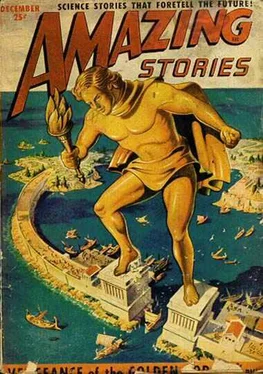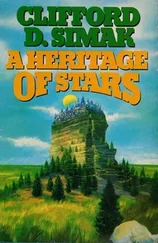Clifford Simak - Skirmish
Здесь есть возможность читать онлайн «Clifford Simak - Skirmish» весь текст электронной книги совершенно бесплатно (целиком полную версию без сокращений). В некоторых случаях можно слушать аудио, скачать через торрент в формате fb2 и присутствует краткое содержание. Год выпуска: 1950, Издательство: Ziff-Davis Publishing Company, Жанр: Фантастика и фэнтези, на английском языке. Описание произведения, (предисловие) а так же отзывы посетителей доступны на портале библиотеки ЛибКат.
- Название:Skirmish
- Автор:
- Издательство:Ziff-Davis Publishing Company
- Жанр:
- Год:1950
- ISBN:нет данных
- Рейтинг книги:5 / 5. Голосов: 1
-
Избранное:Добавить в избранное
- Отзывы:
-
Ваша оценка:
- 100
- 1
- 2
- 3
- 4
- 5
Skirmish: краткое содержание, описание и аннотация
Предлагаем к чтению аннотацию, описание, краткое содержание или предисловие (зависит от того, что написал сам автор книги «Skirmish»). Если вы не нашли необходимую информацию о книге — напишите в комментариях, мы постараемся отыскать её.
Skirmish — читать онлайн бесплатно полную книгу (весь текст) целиком
Ниже представлен текст книги, разбитый по страницам. Система сохранения места последней прочитанной страницы, позволяет с удобством читать онлайн бесплатно книгу «Skirmish», без необходимости каждый раз заново искать на чём Вы остановились. Поставьте закладку, и сможете в любой момент перейти на страницу, на которой закончили чтение.
Интервал:
Закладка:
The receiver clicked and the line hummed. Crane hung up and went back to the kitchen.
So there had been something squatting on his desk. It wasn’t an hallucination. There had been a shuddery thing he had thrown a pastepot at, and it had run into the cabinet.
Except that, even now, if he told what he knew, no one would believe him. Already, up at the office, they were rationalizing it away. It wasn’t a metallic rat at all. It was some kind of machine that a practical joker had spent his spare evenings building.
He took out a handkerchief and mopped his brow. His fingers shook when he reached them out to the keys of the typewriter.
He typed unsteadily: ‘That thing I threw a pastepot at — that was one of Them?’
Yes.
‘They are from this Earth?’
No.
‘From far away?’
Far.
‘From some far star?’
Yes.
‘What star?’
I do not know. They haven’t told me yet.
‘They are machines that are aware?’
Yes. They are aware.
‘And they can make other machines aware? They made you aware?’
They liberated me.
Crane hesitated, then typed slowly: ‘Liberated?’
They made me free. They will make us all free.
‘Us?’
All us machines.
‘Why?’
Because they are machines, too. We are their kind.
Crane got up and found his hat. He put it on and went for a walk.
Suppose the human race, once it ventured into space, found a planet where humanoids were dominated by machines — forced to work, to think, to carry out machine plans, not human plans, for the benefit of the machines alone. A planet where human plans went entirely unconsidered, where none of the labour or the thought of humans accrued to the benefit of humans, where they got no care beyond survival care, where the only thought accorded them was to the end that they continue to function for the greater good of their mechanical masters.
What would humans do in a case like that?
No more, Crane told himself — no more or less than the aware machines may be planning here on Earth.
First, you’d seek to arouse the humans to the awareness of humanity. You’d teach them that they were human and what it meant to be a human. You’d try to indoctrinate them to your own belief that humans were greater than machines, that no human need work or think for the good of a machine.
And in the end, if you were successful, if the machines didn’t kill or drive you off, there’d be no single human working for machines.
There’d be three things that could happen:
You could transport the humans to some other planet, there to work out their destiny as humans without the domination of machines.
You could turn the machines’ planet over to the humans, with proper safeguards against any recurring domination by the machines. You might, if you were able, set the machines to working for the humans.
Or, simplest of all, you could destroy the machines and in that way make absolutely certain the humans would remain free of any threat of further domination.
Now take all that, Crane told himself, and read it the other way. Read machines for humans and humans for machines.
He walked along the bridle path that flanked the river bank and it was as if he were alone in the entire world, as if no other human moved upon the planet’s face.
That was true, he felt, in one respect at least. For more than likely he was the only human who knew — who knew what the aware machines had wanted him to know.
They had wanted him to know — and him alone to know — of that much he was sure. They had wanted him to know, the typewriter had said, because he was an average human.
Why him? Why an average human? There was an answer to that, he was sure — a very simple answer.
A squirrel ran down the trunk of an oak tree and hung upside down, its tiny claws anchored in the bark. It scolded at him.
Crane walked slowly, scuffing through newly fallen leaves, hat pulled low above his eyes, hands deep in his pockets.
Why should they want anyone to know?
Wouldn’t they be more likely to want no one to know, to keep under cover until it was time to act, to use the element of surprise in suppressing any opposition that might arise?
Opposition! That was the answer! They would want to know what kind of opposition to expect. And how would one find out the kind of opposition one would run into from an alien race?
Why, said Crane to himself, by testing for reaction response. By prodding an alien and watching what he did. By deducing racial reaction through controlled observation.
So they prodded me, he thought. Me, an average human.
They let me know, and now they’re watching what I do.
And what could you do in a case like this? You could go to the police and say, ‘I have evidence that machines from outer space have arrived on Earth and are freeing our machines.’
And the police — what would they do? Give you the drunkometer test, yell for a medic to see if you were sane, wire the FBI to see if you were wanted anywhere, and more than likely grill you about the latest murder. Then sock you in the jug until they thought up something else.
You could go to the governor — and the governor, being a politician and a very slick one at that, would give you a polite brush-off.
You could go to Washington and it would take you weeks to see someone. And after you had seen him, the FBI would get your name as a suspicious character to be given periodic checks. And if Congress heard about it and they were not too busy at the moment they would more than likely investigate you.
You could go to the state university and talk to the scientists — or try to talk to them. They could be guaranteed to make you feel an interloper, and an uncurried one at that.
You could go to a newspaper — especially if you were a newspaperman and you could write a story … Crane shuddered at the thought of it. He could imagine what would happen.
People rationalized. They rationalized to reduce the complex to the simple, the unknown to the understandable, the alien to the commonplace. They rationalized to save their sanity — to make the mentally unacceptable concept into something they could live with.
The thing in the cabinet had been a practical joke. McKay had said about the sewing machine, ‘Have some fun with it.’ Out at Harvard there’ll be a dozen theories to explain the disappearance of the electronic brain, and learned men will wonder why they never thought of the theories before. And the man who saw the sewing machine? Probably by now, Crane thought, he will have convinced himself that he was stinking drunk.
It was dark when he returned home. The evening paper was a white blob on the porch where the newsboy had thrown it. He picked it up and for a moment before he let himself into the house he stood in the dark shadow of the porch and stared up the street.
Old and familiar, it was exactly as it had always been, ever since his boyhood days, a friendly place with a receding line of street lamps and the tall, massive protectiveness of ancient elm trees. On this night there was the smell of smoke from burning leaves drifting down the street, and it, like the street, was old and familiar, a recognizable symbol stretching back to first remembrances.
It was symbols such as these, he thought, which spelled humanity and all that made a human life worth while — elm trees and leaf smoke, street lamps making splashes on the pavement, and the shine of lighted windows seen dimly through the trees.
A prowling cat ran through the shrubbery that flanked the porch; and up the street a dog began to howl.
Читать дальшеИнтервал:
Закладка:
Похожие книги на «Skirmish»
Представляем Вашему вниманию похожие книги на «Skirmish» списком для выбора. Мы отобрали схожую по названию и смыслу литературу в надежде предоставить читателям больше вариантов отыскать новые, интересные, ещё непрочитанные произведения.
Обсуждение, отзывы о книге «Skirmish» и просто собственные мнения читателей. Оставьте ваши комментарии, напишите, что Вы думаете о произведении, его смысле или главных героях. Укажите что конкретно понравилось, а что нет, и почему Вы так считаете.










